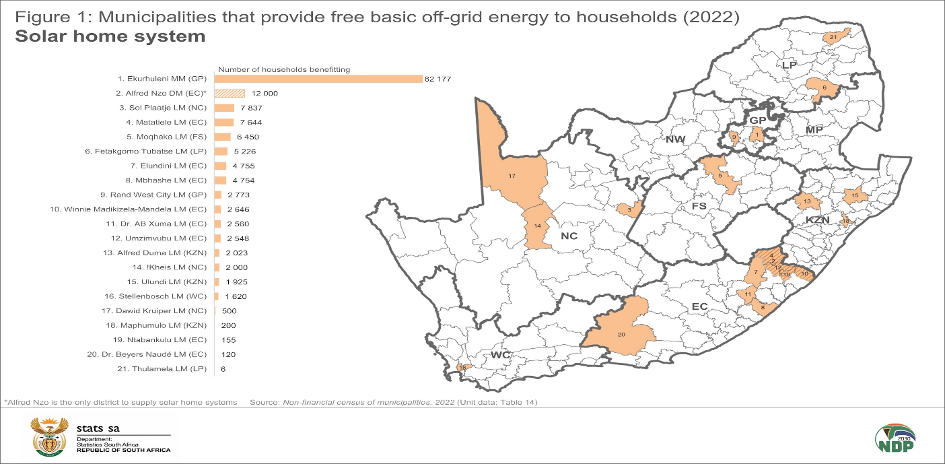Approximately 60% of rural households in South Africa lack access to electricity. Most low-income urban settlements lack access to renewable energy, and over 40% of households connected to the grid are considered energy poor, spending more than 20% of their monthly income on electricity. Many households and businesses are embracing renewable energy as an alternative to traditional energy sources due to load shedding. Municipalities are also helping by providing off-grid energy sources to some of the poorest households. The Free Basic Alternative Energy (FBAE) policy encourages municipalities to offer poor households that are not connected to the grid with different sources of energy. The policy primarily targets rural municipalities with a high number of households that lack access to electricity. The alternative sources of energy under the FBAE policy include coal, liquefied petroleum gas, fire gel, and paraffin. However, in recent years, municipalities have been providing solar home systems to various households. The 2022 Stats SA data show that of South Africa’s 257 municipalities, 21 municipalities across seven provinces supplied solar home systems to 149,919 households. This is up from 113,197 households in 2017.

Municipalities that provided solar home systems to households (Stats SA, 2022)
In South Africa, approximately 30% of households own cars, while the other 70% rely on buses, trains, and taxis for transportation. However, each of the available modes of public transport has challenges. The road network in South Africa, both in provincial and local settings, is in poor condition, with most maintenance being conducted on unpaved rural road networks. Only 23.7% of rural road networks can be certified as all-weather roads. 42.5% of South Africa’s population in rural areas live beyond two kilometers of an effective all-weather road. Approximately 6.3% of the rural population lives in areas that are completely isolated from the road network.
Rural Access Index (RAI) scores are particularly low in the Free State (23.6%), the Eastern Cape (31.9%), and the Northern Cape (44.5%) provinces. South Africa’s transport policies aim to adopt a multi-faceted approach in order to address these issues. The approach includes infrastructure investments, technological innovations, and improvements to public transport options, such as strengthening road networks, installing intelligent traffic management systems, and enhancing services for taxis, buses, and trains. Additionally, South Africa aims to enhance road safety initiatives, promote sustainable transport options, and improve the taxi industry.
In South Africa, waste management remains a significant challenge, particularly for backyard dwellers who are often excluded from formal waste services. Approximately one in three people in South Africa lack access to regular waste collection services, and as a result, they often burn waste in public places. Around 60.5% of households across South Africa have their refuse collected once a week. 34.9% of households rely on communal or household refuse dumps, and 2.4% do not have access to any waste disposal facilities. Although these figures have shown a slight change over the years, there are significant differences between urban and rural areas, as well as between urban formal and informal settlements.
Solid waste management (SWM) is one of the major challenges in South Africa. South Africa’s waste management policies are governed by the National Environmental Management Waste Act, 2008, and the National Waste Management Strategy (NWMS). The NWMS outlines a strategic approach to waste management, emphasizing waste minimization, reuse, recycling, and recovery. The act encourages formalizing waste pickers, initiating waste-to-energy initiatives, promoting recycling at all stages of the waste cycle, and adopting practices that divert waste from landfills. The strategy also focuses on promoting a circular economy and addressing issues such as plastic pollution, illegal dumping, the production of alternative energy, and environmental conservation.
This Post was submitted by Climate Scorecard South Africa Country Manager Rugare Zhou.
Learn More Resources
- Department of Minerals and Energy (South Africa). (2007, April 2). Free Basic Alternative Energy Policy: Households Energy Support Programme (Notice 391). Government Gazette, 29760, p. 3
- https://www.statssa.gov.za/?p=17167
- https://www.impactamplifier.co.za/news/south-africas-energy-schizophrenia-why-hasnt-the-country-achieved-affordable-power-for-the-poor/
- https://wasteaid.org/programmes/current-programmes/south-africa/?
- Going beyond the Infrastructure Funding Gap: A South African Perspective Transport Sector Report, DBSA, November 15, 2022
- Mtizi, C., 2017. Southern African Solutions to Public Transport Challenges. 36th Southern African Transport Conference (SATC 2017)
- Nyakabawu, S. and Schenck, C., 2025. Exploring Waste Management Practices Among Backyard
- Dwellers in Fisantekraal, South Africa. Urban Forum. https://doi.org/10.1007/s12132-025-09535-8
- Nyika, J. M., Onyari, E. K., Mishra, S., and Dinka, M. O. 2020. Waste Management in South Africa
- DOI: 10.4018/978-1-7998-0198-6.ch014
- https://www.statssa.gov.za/?p=11527

